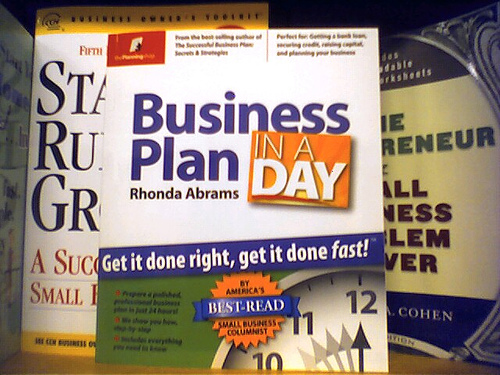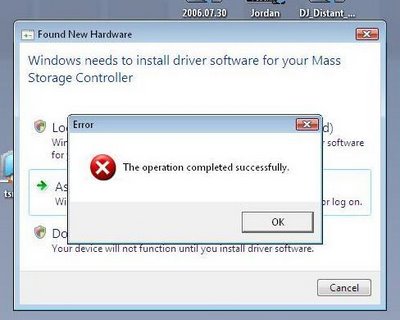The Business Plan HQ, All You Need To Know About Business Plans
With special emphasis on online businesses
===========================================
Confusius say: Ice Cream Sausage OK if it pre-planned

What is a business plan?
A business plan (free sample) is a written document drawn up by the owners/managers of a business that describes the business and its objectives, the financing and structure, the markets the business operates in, the strategies employed and the financial forecasts it will be working towards. It analyses the risks and uncertainties ahead; the management and market considerations; the people, financial and other resources requried and serves, to outsiders, as a prospectus of the company.
Why create a business plan?
There are formal reasons e.g. securing funding, reorganising debts and floating or otherwise selling a business. There are sound internal reasons too, a good business plan is also a vital, all-round tool. Whether the business is a startup or a long running venture, a realistic, working business plan charts the course ahead, measures progress and is crucial to the effective long term success of the business.
This page will cover all you need to know (hopefully) on the subject of Business Plans, particularly in the context of online businesses.
If it's an online business, where's the "E-book", baby?

Business Plans for Online Businesses
In what way do business plans for internet businesses differ from normal business plans? Although it varies depending on the nature of your online business, in general online businesses are less subject to resource-based constraints than real-world businesses are. For example, if you start up a business manufacturing spanners, and you need supplies of metal from which you fabricate the spanners, the need to buy large quantities of raw material places limits on how much your business can expand within a given time frame.
Even if you were lucky enough to win a giant contract from the government demanding that you supply them with 20 million spanners, you probably couldn't do it. You wouldn't have the capital on hand to afford the raw materials. You wouldn't have enough spanner-making machines or the workers to operate them. You are constrained by harsh reality. If you start up an online business such as a online dating service, say, you are simply not subject to the same constraints. Once your system is up and running, it could probably just as well handle 5 million customers as 1 million. Yes, you might need to pay for more bandwidth from your hosting company but, in general, expansion is something you could very easily accommodate.
Why does this matter for your business plan? You're going to need to include projections about the amount of business you will do. It's easier for real-world businesses to do this because their limits are much more obvious. When developing an online business plan, however, you'll find it's much more of a guessing game. Exaggeration of your prospects is one of the most dangerous traps you can fall into when drawing up an online business plan. Lack of realism puts investors off. To an experienced appraiser, it is one of the tell-tale signs that you haven't done your research, that you're not professional in your approach, and that your whole business idea is probably a back-of-the-envelope dream.
If this is the tail, GET ME OUTTA HERE

Size matters - or, at least, perception of size
The startup costs for an online business are also often very small. This may mean that your own investment in the startup is minimal. Presented the wrong way, this might make it difficult for anyone reading the business plan to take you seriously. If you put down "Computer in my bedroom" when listing the company's capital resources, it can be tricky to avoid sounding like a unprofessional wannabe. Through confidence and artful use of language, though, you can overcome this difficulty.
Another distinguishing aspect of online business plans is the emphasis placed on the company's website. For many online businesses, the website is the centre of their universe. It's not just some web-enabled business card but the fulcrum of their entire business, the driver of sales and profitability. For this reason, some online business plans feature quite in-depth discussions of the company's website. Design aspects may be discussed; usability audits; SEO (Search Engine Optimisation) strategies and the like. It's up to you whether you want to go into all this. How important the website is, of course, depends on the nature of your business.
Something that must always be carefully considered when you're writing an online business plan is the use of jargon. To go back to our earlier example of a spanner manufacturer, the business appraisal unit of a bank is going to be used to the terminology typically used to discuss a manufacturing enterprise : unit cost, margin, throughput and so on. They will almost certainly not be familiar with some of the terminology you might use to describe your online business. If you start throwing around terms like Adsense, PPC, and Page Rank you're going to lose them. No one likes to sound like an ignoramus so if they don't know what the terms means they probably won't even ask you. They'll just toss your business plan in the bin and move on to the next. This isn't to say that you should avoid jargon completely. A judicious use of business-specific terminology can give the impression that you really do know your stuff. Just be sure and pad the terminology with some explanations and don't overuse it.
Fertilizer and Business Plans don't mix

What should a Business Plan contain?
So, once you've decided you need a business plan, what are your options? There is no rigidly defined structure for a business plan, but it usually has at least the following sections
Executive Summary
This is the most important part of your online business plan. If you have limited time to polish your plan before presenting it, this is the part you need to polish most. Quite simply, if it's not good enough, the other parts of your online business plan won't even be read! You can regard the Executive Summary as a distillation of all the other parts of the plan, or you can regard the other parts of the plan as an elaboration of the Executive Summary. The Executive Summary must be self-sufficient : that is it must contain all of the key information that a potential investor needs to appraise your proposal. It must contain a description of what your business actually does (it's not always obvious), an analysis of the market demand in that business sector, and, finally, what it is about your company that makes it uniquely able to capitalise on the opportunities in that niche. Typically, an executive summary can be anything from 1 to 4 pages in length.
Market Analysis
In this section you need to demonstrate why there is a market demand for what your company offers. Illustrate it with facts and figures from reputable sources (provide citations in each case).
Be sure and define the specific sector of the market which you are aiming at. For example, if you're planning to set up a website to sell socks online to the British market, don't just quote the fact that the British people spend £6 billion on internet shopping each year. Give the figure for how much they spend on socks specifically. Talk not just about the existing state of the market but about how it is changing dynamically. Again, quote figures to back up your claims. Strategy
Describe what you're actually going to do over the next few years to advance your business goals. Risks
Put in a section on the risks your business faces - things that might make your projections fail to come true. It's help to show investors that you're not naive and over-confident in your approach. Management Biographies
No need to go into great detail here, unless there is something impressive and pertinent in your background. Don't put in anything which doesn't bolster your case for funding. If you worked in Mickey D's for 3 years flipping burgers, just leave it out, unless the burger-flipping experience somehow yielded precious insights which helped inspire your new venture.
Cash Flow Projections
Yes, you're going to have to put some real numbers into your business plan. After all, investors want to know when they're going to be paid back.
How long should your business plan be? There are no hard and fast rules but, generally, 10 - 20 pages is the norm. If you have a lot of peripheral material you want to include such as market research, technical analysis of some product or process you have or elaborate financial details, it's best you factor them out of the business plan proper and include them as appendices. You don't want to let the readers of your business plan get lost in a wilderness of details.
An Exit Plan
While leaving the business might be the last thing on your mind at this stage, a good business plan would likely also include a plan for the owners to exit. While the exit plan for many owners is the wooden box plan (i.e. the business dies when I die), other owners plan for succession and for a smooth transition to the new management. Because eventually there will be new management, whether it's children who take over the business, another firm that acquires it or, if the business gets big enough, when it gets listed on a stock exchange. The posts on this blog provide in-depth advice on valuing and selling businesses.
Don't hurry it. Your plan is vital to your business so plan carefully

Help with writing your business plan
You may find the prospect of having to write a business plan intimidating. Don't worry, though. There are a lot of resources out there that will help you on your way. First, you should read a few general guides on how to construct business plans. These will tell you what's important and what's not and give you an idea of the general layout expected.
Growthink is a company which, among other things, develops custom business plans for its clients. But they also provide a general guidance document (pdf) for those who want to do it themselves. It's well worth reading because it contains a lot of hard-headed advice by people who are out there doing it every day about what impresses investors and what puts them off.
Local governments often try to give would-be enterpreneurs a helping hand. A few good guides to constructing business plans can be found on their websites. Note that these are not specifically online business plans, but can still be helpful nonetheless.
On the website of this British enterprise agency you can find links to business plan guides and business plan templates and here are some free sample business plans to get you started.
If you live in the UK, it's worth noting that the local business promotion agencies will often give you free help and advice on constructing your business plan if you contact them.
Most of these guides are for business plans generally, rather than specifically online business plans. Naturally, the majority of the material is still valuable. You just need to sift out the details which are not relevant. If you're looking for something more focused, however, there is a good tutorial on how to write a business plan for an e-business. It has a particularly good section on the business plan's presentation details, such as how to choose a font and so forth.
With all of these guides telling you what to do when you set about creating your online business plan, you might want to consult this one too, which tells you what NOT to do.
If you're sometimes befuddled by the terminology used in business plans, check out some of the business term glossaries below where you can hopefully find a layman-level explanation: 1 | 2 | 3
Investors DO read the small print

Sample Business Plans
The next step up from a template is a fully-fledged business plan. Unless your potential investors are seriously inattentive, you're not going to get away with presenting a fully copied and pasted business plan. However, looking at a full business plan, particularly one from a real or potentially real company, can be more instructive than looking at a template in many ways. It gives you a feel for the kinds of variation which exist among business plans in the real world. You'll see that they don't always have to follow a rigid structure. If something isn't relevant you can just leave it out. Looking at fully fleshed out business plans also gives you an idea of how you can be creative in your pitch to potential investors. For example, in real business plans, you'll see sometimes see innovative financing arrangements proposed, such as offering equity participation to investors, or a number of seats on the board. You'll sometimes even see further rewards dangled in front of the investors if the planned financial targets are not achieved. It reminds you that a business plan is the product of a living, breathing company, not just a soulless piece of text.
The University of Texas in Austin has boasts one of the most celebrated business schools in the world. More importantly for our purposes, it also plays host to a Moot Court Business Plan contest, a kind of World Championship event in which the best students from the best business schools in the world compete against one another to see who has the best business plan. While this may seem like nothing more than an academic exercise, in fact, many of the business plans presented in the competition are acted upon. They receive real funding and the students who presented them become the managers of a real-world business.
This is all well and good but how does it help you? After all you just want to draw up an online business plan and get funding for your business, not enter some glorified contest. What's good about the Moot Court contest is that the competition entries are available online. So you can go and download business plans that were drawn up by elite MBA students, business plans that came through multiple rounds of scrutiny by real world investors and business people and that were eventually approved by them. There is not just a single winner in the contest. Instead, there are a number of winners under different categories. Since you're interested primarily in online business plans, not all are going to be relevant to you. One of the competition categories is "Internet Business Plans". You should find a lot to interest you there.
As well as offering up the competition entries for public perusal, the businessplans.org website hosts a number of interesting articles which will help you in preparing specific aspects of your business plan.
A large number of sample business plans, some of them for online businesses, are offered on this website.
Unfortunately, they're shown only as HTML files. To edit them, you'd need to either buy the software the page is promoting, or just copy and paste the text from the HTML pages into your word processor. Even just reading them over, however, can give you some ideas about good content for your own plan.
Clarity ISN'T highly over rated

Business Plan Templates
A good business plan template, presented as a Microsoft Word file, is available for download here.
As well as the business plan template itself, dubbed Free-Plan, you get an in-depth commentary and guide which walks you through the process of modifying the template for your own needs.
The Innovateur organisation offers a business plan template for download at this link (doc).
Support tools which will help you put together the financial aspects of your online business plan can be found on the same website (these require Excel)
Inc. is a magazine for entrepreneurs focused on the US market. The website is a great resource with many interesting articles and features of interest to those who either are or want to be involved in running a business. For our purposes, the chief section of interest is the one dedicated to helping start-ups prepare their business plan. You'll find many insightful articles there which will aid your understanding of the issues involved in drawing up an online business plan.
Isn't software wonderful?

Business Plan Software
You don't need to use Word and Excel to put together your online business plan. There is software which has been specially designed to facilitate the writing of business plans.What advantages does business plan software offer compared to the manual approach? First of all, typically these software packages come with literally hundreds of ready made business plans which you can adapt to suit your own circumstances. Naturally, not all of these will be online business plans, but some will be. Secondly, they have strong presentational advantages. They will usually contain software wizards you can use to put some diagrams together. They will generate tables of contents for you automatically, and they will help you weave all the separate parts of your business plan together seamlessly. Yes, you can do all of that by hand, but it will involve a lot more effort.
If you're interested in exploring the software approach to writing your own online business plan, you can check out some of the links below :
Note that almost no business plan software comes with a free 30-day trial that is customary in the software world. Clearly because, for many people, a business plan is a once-only need, the vendors are afraid that people would use their software to knock out a business plan then not pay up. So if you want to use business plan software you're almost certainly going to have to cough up some cash.
Irrelevant? But did you look?

Business Plan Charts and Figures
Do you need diagrams? It's not an absolute necessity, but it's highly recommended. People tend to find walls of text intimidating. A picture here and there offers a bit of breathing space. In fact, psychological studies have shown that a person's comprehension of a piece of text increases if it is accompanied by a picture even when the picture has no relevance whatsoever to the content of the text.
It's highly advisable to throw a few pictures in there then. They could be pictures of you, your business premises, the design of your web page, or graphs and pie charts illustrating sales projections and the like.
If you're downloading a ready made business plan or modifying a business plan template to suit your needs, it will probably consist entirely of text. Even if there are graphics showing revenue forcasts or other business metrics, they're clearly not going to be appropriate to your business. And even if you wanted to bluff it, they might be orders of magnitude different or even in the wrong currency.
In other words, if you want business plan graphics, you're going to have to make them yourself. This is one of the trickiest aspects of putting an online business plan together. In extremis, you can copy and past the entire text of your business plan from one you've downloaded. But, for the graphics, you're going to have to do some work. So what tools can you use to help you prepare business plan graphics?
One good utility is called Exl-Plan. It's actually a plug-in for Excel rather than a standalone program so you will need a copy of Excel before you can run it. It greatly simplifies the process of creating the kinds of accounting-related charts and tables - such as cash-flow projections, income statements, balance sheets and the like - you may want to use in your online business plan.
The basic version of the program is free and it can output in the correct format for British, American and Canadian accounting systems. More elaborate versions of the software, which can project further into the future, also exist.
You can learn more about Exl-Plan or download it from here.
Conclusion
As you can see, there is a wealth of tools and resources out there to help you construct a cogent and compelling business plan. From business plan templates to fully-fledged ready made business plans, the raw materials are there for you. All you need is to be er, creative, and just go do it! ;-)








